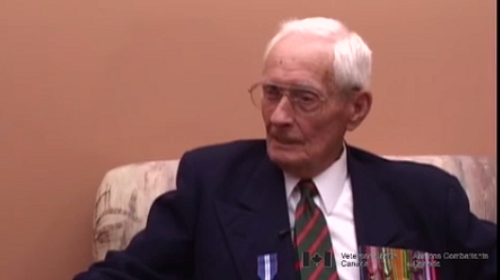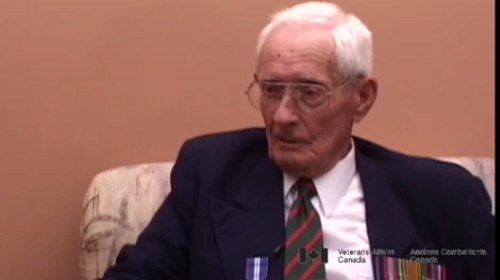Dangers in the Coal Mine
Heroes Remember
Dangers in the Coal Mine
Transcript
So I was in a group of 200. It was British and Canadians.
A hundred and sixty-five or 70 Canadians and
the remainder to make 200 were British, 35 or 40 or something.
So we landed in Japan.
So then they broke us up in three parties,
the 200, to around 60 some people in each party.
So they called that a chuutai.
That would be maybe like our company or something.
So you hadn't made each shift, one chuutai would work the first shift
and then number two chuutai would be two and then three.
So that would take up the 24 hours see.
Well I was ichi - chuu, I was number one party, ichi, ichi chuutai.
So we went down the first shift
and then we were relieved by the second shift.
But now when you work in the mines around here,
or around all civilized countries, you work eight hours.
But you, when you work your seven or eight hours,
you go to the stages to bring you up and after you're up,
the ones that's relieving you go down.
But there, we had to stay there just the opposite.
So instead of eight hours, we were putting 12, 13,
and 14 hours down that mine.
It was soft coal that mine, yeah. Very dusty and old.
It had been a mine that had, that had been discontinued.
They had an explosion and it didn't operate for many years I guess.
So now we were improving it and modernizing it.
So it was, it was dangerous, dangerous work.
Plus now the Americans were starting to reach Japan once in a while.
So when they'd raid, the American Air Force would raid Japan,
all lights and all power was cut off.
So if you were down the bottom of the mine and the power went off,
how are you gonna get out of the mine?
Now these soft coal mines are just saturated with mining gas
so you couldn't soon, five big breathes and you wouldn't be able to get out.
You know, once the... so the Japs were afraid of that too.
Of course the Jap foreman and them down the mine
when the power would all go off, they'd drop everything
and make for the, to get out because they too were in the same boat.
So we didn't care. Half of us were half-dead by this time.
Description
Mr. Ross describes the organization of the work crews at Omini coal mine and elaborates on some of the mine’s dangers.
Lancelot ‘Lance’ Ross
Mr. Lance Ross was born in Lac-Megantic, Quebec on October 7, 1911. His father was a carpenter and a family farmer. Mr. Ross went to work at the age of fourteen, holding many odd jobs that paid $1.00 to $1.50 a day. Impatient with the wait for joining the air foce, Mr. Ross joined the army and went overseas to Hong Kong. He was captured and spent time in POW camps. During this time, Mr. Ross kept a diary that was used for the prosecution of Japanese war crimes. After the war, he was active in getting recognition for Hong Kong Veterans.
Meta Data
- Medium:
- Video
- Owner:
- Veterans Affairs Canada
- Duration:
- 3:04
- Person Interviewed:
- Lancelot ‘Lance’ Ross
- War, Conflict or Mission:
- Second World War
- Battle/Campaign:
- Hong Kong
- Branch:
- Army
- Units/Ship:
- Royal Rifles of Canada
- Rank:
- Sergeant
- Occupation:
- Platoon Sergeant
Related Videos
- Date modified:












